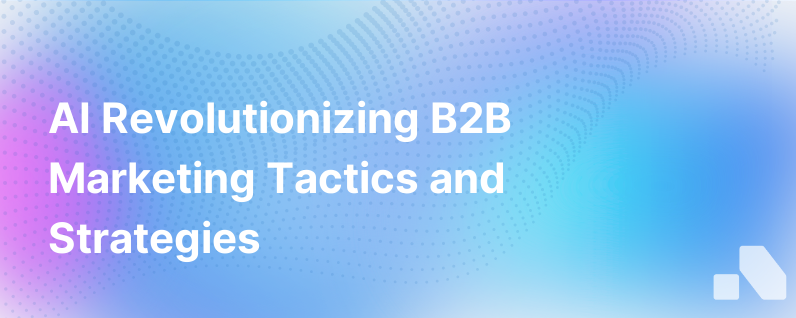Ai In B2B Marketing
Published on October 7, 2023 by David Zhang
In the rapidly evolving B2B landscape, artificial intelligence (AI) is transforming marketing from a predominantly creative discipline into a data-driven field that encompasses strategic insights and decision-making capabilities beyond human limitations. The convergence of AI in B2B marketing is enabling companies to personalize experiences, optimize campaigns, and analyze data with unprecedented precision and scale.
Let's dissect the role of AI in B2B marketing to understand how it's redefining the industry, where it's making the most significant impact, and the potential it harbors for modern-day marketers.
Understanding AI in B2B Marketing:
Artificial intelligence refers to the simulation of human intelligence processes by machines, particularly computer systems. These processes include learning (acquiring information and rules for using the information), reasoning (using rules to reach approximate or definite conclusions), and self-correction. When applied to B2B marketing, AI can handle complex tasks, analyze big data, and enable marketers to make informed strategic decisions.
How is AI Transforming B2B Marketing?
-
Personalized Buyer Experiences: Gone are the days when one-size-fits-all marketing strategies sufficed. Today's B2B buyers expect highly personalized interactions. AI empowers marketers to craft customized content and experiences by analyzing customer data, predicting behaviors, and personalizing touchpoints across the buyer's journey. This leads to more engaged prospects and, ultimately, improved conversion rates.
-
Predictive Analytics and Lead Scoring: AI algorithms can analyze vast amounts of data to identify patterns and predict future customer behaviors. B2B marketers harness these insights to prioritize leads and opportunities that are most likely to convert, effectively focusing time and resources on nurturing the best prospects.
-
Optimized Marketing Campaigns: B2B marketers use AI to dynamically optimize marketing campaigns in real-time. AI-driven tools can test different ad copy, layouts, images, and calls-to-action, learning which combinations yield the best results. This means that campaigns are continuously improved without the need for human intervention.
-
Chatbots and Conversational Marketing: AI-powered chatbots have become instrumental in enhancing customer service and lead qualification. They can engage potential clients through intuitive conversations, answering queries, and collecting lead information 24/7. This facilitates a seamless buyer experience and ensures no opportunity slips through the cracks.
-
Content Generation and Curation: Artificial intelligence has made strides in natural language generation, allowing for automated content creation. AI can write reports, create news stories, and even craft social media updates that are indistinguishable from human-written content. It can also curate and recommend content more effectively, helping marketers provide value to potential customers at the right time.
-
Programmatic Advertising: AI systems are revolutionizing ad buying by automating the decision-making process for targeting more specific audiences. B2B marketers leverage programmatic platforms to buy advertising space in real-time, reducing costs and enhancing the efficiency of ad spend.
-
Customer Insights and Market Research: Sophisticated AI algorithms can sift through social media, online forums, and other digital platforms to gather insights about market trends and customer opinions. This intelligence helps shape marketing strategies, product development, and customer experience enhancements.
-
Email Marketing Automation: AI is redefining email marketing by predicting the best times to send emails, segmenting subscribers based on their behavior, and crafting subject lines that increase open rates. Automated email workflows then can tailor content to lead behavior, making communication much more effective.
Challenges and Considerations:
Despite the immense potential of AI, it poses several challenges and ethical considerations:
-
Complexity and Cost: Implementing AI solutions can be complex and costly. Not all B2B marketers have the resources or expertise to utilize these technologies effectively.
-
Data Privacy: With the increased reliance on customer data, businesses must navigate the complexities of data privacy regulations such as GDPR and ensure that they maintain the trust of their clients.
-
Transparency and AI Bias: AI algorithms can inherit biases present in the data they are trained on. Marketers must ensure that they execute AI applications in a transparent manner, constantly review outcomes, and correct any unintentional biases.
The Future of AI in B2B Marketing:
As the boundaries of AI technology continue to expand, we can expect to see even more sophisticated applications within B2B marketing. The integration of AI with augmented and virtual reality may drive the next wave of immersive marketing experiences. The potential for AI to automate higher-level marketing tasks will also increase, freeing up human marketers to focus on strategy and creative endeavors that remain uniquely human.
In conclusion, AI is not only reshaping B2B marketing, but it also holds the promise for cultivating deeper, more meaningful relationships with customers. It enables a data-driven, targeted, and customer-centric approach that aligns with the modern B2B landscape where personalization, efficiency, and strategic insights are key differentiators.
Marketers who effectively harness AI technology will position their businesses at the forefront of innovation, driving growth and fostering sustainable competitive advantages in their respective industries.